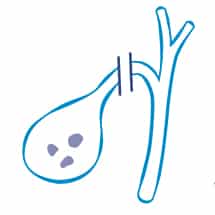
Gallstones are small, hard deposits that form in the gallbladder, a pear-shaped organ that stores and concentrates bile. Bile is a digestive fluid that helps the body to break down and absorb fat. Bile is made in the liver.
Gallstones are a common complication after weight loss. They are more likely to develop in people who have lost weight quickly, such as after bariatric surgery.
Symptoms of gallstones
The most common symptom of gallstones is pain in the upper right abdomen. This pain can be sudden and severe, and it may last for several hours. Other symptoms of gallstones may include:
Diagnosis of gallstones
If you are experiencing any of the symptoms of gallstones, your doctor will likely order an ultrasound of your abdomen to confirm the diagnosis plus a blood test.
Treatment of gallstones
The main treatment for gallstones is surgery to remove the gallbladder with the stones in it. This surgery is called a cholecystectomy. It is relatively simple surgery that is performed laparoscopically (using keyhole surgery). An x-ray of the bile duct (cholangiogram) is often done at the same time to check no stones have moved into the bile duct.
Recovery after gallbladder removal
Most people recover from gallbladder removal surgery quite quickly. You will be able to go home from the hospital the same day or the next day after surgery. You will be able to resume a light diet straight away and need to avoid fatty meals for the first few weeks. Most people need one to two weeks off work or normal activity.
Gallstones and weight loss surgery
If you have had weight loss surgery and you are experiencing gallstones, it is important to talk to your doctor about your treatment options. Gallbladder removal surgery is the most common treatment for gallstones.
If you are preparing for weight loss surgery, you will routinely be checked for the presence of gallstones beforehand with an abdominal ultrasound. If gallstones are present, you may choose to have a cholecystectomy at the same time as your weight loss operation which saves you needing to have a second operation later.
Conclusion
Gallstones are a common complication after weight loss surgery. The chance of it happening after weight loss surgery is approximately 10-20%. The most common symptom is sudden upper abdominal pain. If you are experiencing any of the symptoms of gallstones, talk to your doctor right away.